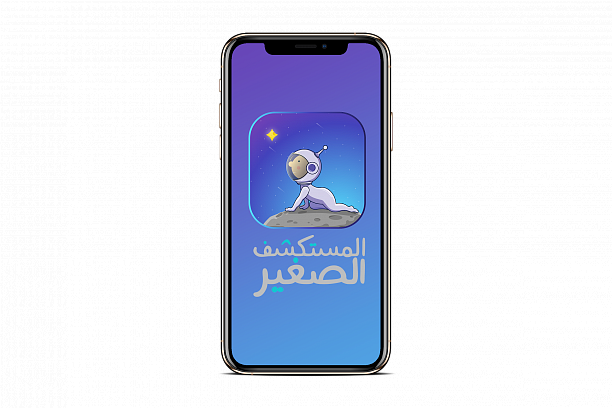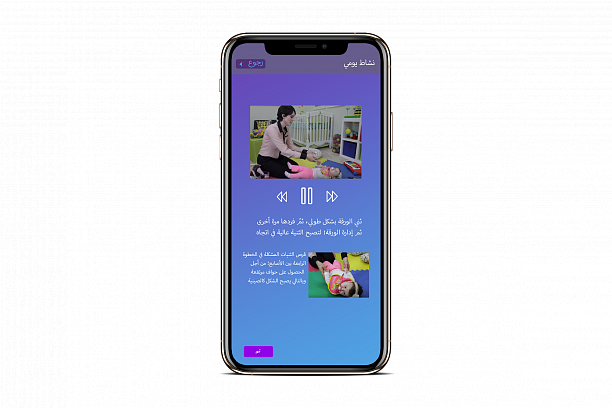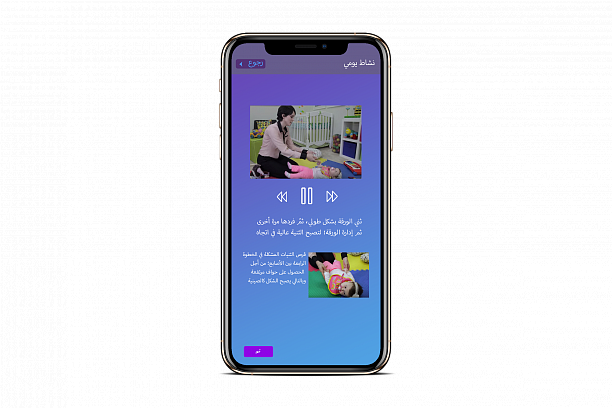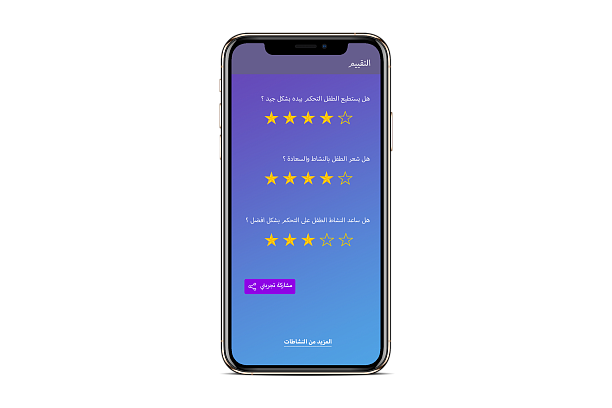49574
Young Explorer Inc.
App Helps Children with Disabilities Rehabilitate at home
Jordan
Market: Other, Artificial Intelligence, Mobile applications
Stage of the project: Prototype or product is ready
Date of last change: 05.10.2020
Jordan
Market: Other, Artificial Intelligence, Mobile applications
Stage of the project: Prototype or product is ready
Date of last change: 05.10.2020
Idea
Young Explorer proposes an AI-based mobile application to assess the skills of the child and generate a customized rehabilitation plan to fit their needs. Our app can help provide a low-cost solution to millions of families currently without help, and dealing with a dangerous global pandemic.
In addition to home management system for the therapists to manage and assign home tasks to their patients.
In addition to home management system for the therapists to manage and assign home tasks to their patients.
Current Status
Describe what stage of development your project is at now? Is it just an idea or do you have a working product, is your product selling on the market, if so, to what extent? Do you have clients, if so, how many?
Our application has two main parts, one for the patients, and one for the therapists. The patients profile is developed and under testing now by number of selected users. And the therapist profile is being developed, and will be ready by the end of November. We will launch the app officially on the stores in December, 2020.
For patients we have 200 clients who want to register once the application is ready.
Our application has two main parts, one for the patients, and one for the therapists. The patients profile is developed and under testing now by number of selected users. And the therapist profile is being developed, and will be ready by the end of November. We will launch the app officially on the stores in December, 2020.
For patients we have 200 clients who want to register once the application is ready.
Market
Initially, in the next 18 months we are targeting the Arab families, in the Middle East and South Africa, and displaced communities around the world (refugees ), who have kids with disabilities or learning difficulties, especially young mothers in their 20s,30s and 40s, they are more than 10 million families. In addition to Arabic speaking therapists.
Our service is platform-based which will give us the chance to expand from the pilot market, into the whole Arab speaking market around the world, then to the global market. Our initial product is Arabic App, which will be accessible for all Arab speaking, and the next step will be English translation to give us the accessibility to the international markets.
The rehabilitation market for Arab speaking is based on the traditional clinics, and the tradition ways to connect and manage the patient. But with under the recent Covid-19 quarantine, it was obvious that the remote rehabilitation and remote managements of patients is urgent need to fill the gap for all the families who don’t have accessibility to local therapists, and for the therapists who don’t have accessibility to their current patients.
This is also applied to all the rehabilitation market around the world, which suffers a lot during the quarantine, and this will give us the chance to grow and reach more markets and customers locally and globally.
Our service is platform-based which will give us the chance to expand from the pilot market, into the whole Arab speaking market around the world, then to the global market. Our initial product is Arabic App, which will be accessible for all Arab speaking, and the next step will be English translation to give us the accessibility to the international markets.
The rehabilitation market for Arab speaking is based on the traditional clinics, and the tradition ways to connect and manage the patient. But with under the recent Covid-19 quarantine, it was obvious that the remote rehabilitation and remote managements of patients is urgent need to fill the gap for all the families who don’t have accessibility to local therapists, and for the therapists who don’t have accessibility to their current patients.
This is also applied to all the rehabilitation market around the world, which suffers a lot during the quarantine, and this will give us the chance to grow and reach more markets and customers locally and globally.
Problem or Opportunity
The problem
Across the MENA region, there are 20 million children with disabilities and learning difficulties: over half of them do not receive proper care. Without this care, disabled children at home are not able to reach their potential. This creates a difficult learning environment and places a lot of pressure on families. Costly rehabilitation centers that can be located hundreds of miles away simply aren’t a workable solution for millions of these less fortunate kids. Particularly at a time when large swathes of the world are under lockdown, parents need remote help with looking after their children. Also the therapists need an efficient, secure way to manage their patients remotely at home, and assign clear home tasks to them.
The evidence of the need
4 years ago my son Mohammed came to life, a few days after his birth he was diagnosed with many problems such as terticulas in his neck,..etc that need functional and physical therapy. This was a great challenge to us to reach the rehabilitation center in Tel Aviv regularly, because we couldn’t get permission each time. When we could not reach the hospital in Tel Aviv, we used to call the therapist, and then he gave us a set of instructions and exercises to apply with Mohammed at home, which is basically one of the tasks the therapists give parents at the end of each rehabilitation session. These exercises helped to alleviate Mohammed's symptoms during periods of interruption, which led us to go deeper into the problem we face, and discovered that it is a general problem in the MENA and the world.
There are more than 10 million children in the MENA region don’t have accessibility to the rehabilitation centers, and 40m in the world, that is why we decided to find a real solution for all those people, and bring therapy home for them, and started a successful business that is related to my career path as kids trainer as well. Nothing better than working on a business that you have a big passion for, it’s very motivating for me.
After a deep market, competitors, and customers study, I got a real proof that my idea will work well and worth turning it into real business, so I decided to move forward and started gathering the team and building the product.
Our customer and market studies depend on a lot of data gathering and analysis techniques. First, we used an internet research about the problem, the customers, the competitors and their competitive advantages. This was the first proof that there is a problem in the accessibility of the rehabilitation centers for more than 10 million kids in the MENA region, and that there is no Arabic solution to solve this problem properly. This problem is happening due to the huge lack of caring centers for those kids, in addition to that most of these centers are centralized in the main cities, which makes it very difficult
and expensive for a lot of families to reach regularly. Moreover, there is a serious lack of the Arabic content about home development and education of kids with difficulties, which makes it a big challenge for the moms to figure out how to spend quality time with them, and to develop their skills at the same time.
Next, we started the real customer validation, we met locally and online with 30 women fr om Palestine, who are potential customers of our app, and asked them a lot of non-directed questions about their kids rehabilitation’s journey, which was the first indication that there is a need for the App in Palestine.
Then we used an online questionnaire, and directed it to mothers of kids with difficulties in the MENA region, to search their problems, rehabilitation journey buying habits, Etc, 370 mothers filled in the questionnaire, and depending on their answer we got a strong indication of the real market needs.
For example, 55% of the mothers don’t have regular accessibility to the rehabilitation centers, 70% don’t know how to spend the time of their disabled kids at home, 80% search for online activities for their disabled kids, 65% search for resources to increase their kids cognitive skills.
The fourth stage with the market validation was after building the MVP, we sent the application to 20 mothers of kids with disabilities and learning difficulties to test, and if they have intention to sign it. They gave us great feedback about the user experience, and 60% of them signed that they have intention to subscribe for the premium subscription. After analyzing all the previous interviews in depth and studying all the features that attracted the mothers to follow up or move away fr om a certain project, we came to the conclusion that the most missing Arab projects’ features for people with special needs and learning difficulties that are currently on the Internet is the allocation of treatment programs that provide them to be suitable to the situation of each child based on his abilities and needs. And the lack of a system of assessment of the abilities of children at every stage, in order to make parents sure that the development of the child's abilities are on track. Which led us to choose these two characteristics to be the core values that we offer to customers and make us ahead of other projects, wh ere it covers the needs of the missing in the Arab market now?
For the foreign projects that offer the same services we offer, the current advantage we offer to our Arabic market is the Arabic language, wh ere we take care of the activities that we offer, both written and pictured in the videos talking on the use of smooth Arabic language understandable to most of the local dialects in the Arab world. But we must always pay attention to the plans of these projects to expand to other markets such as the Arab market, so we chose a different age group does not provide these services to them, Kinedu application, which is the strongest competitor to our project in the global market covers the needs of children up to the age of only 4 years, We focused on starting from the age of 3 years, so that we will soon be able to cover a higher rate of life than these projects.
Although we got a proven indication about the customer’s needs, we didn’t stop the customer validation process, now we are preparing to finish the assessment system for the first year of the child age, and we are collecting more potential customers contacts for the test.
The Covid-19 quarantine maximize the need to our app, most disabled kids who attended rehabilitation centers lost the chance for regular visits to the centers, and their therapist either stop their rehabilitation exercises until the end of the quarantine, or using nonprofessional ways to connect with their patients, and to assign tasks to them. This situation is great indication about the urgent need of our project to be available during the quarantine.
Across the MENA region, there are 20 million children with disabilities and learning difficulties: over half of them do not receive proper care. Without this care, disabled children at home are not able to reach their potential. This creates a difficult learning environment and places a lot of pressure on families. Costly rehabilitation centers that can be located hundreds of miles away simply aren’t a workable solution for millions of these less fortunate kids. Particularly at a time when large swathes of the world are under lockdown, parents need remote help with looking after their children. Also the therapists need an efficient, secure way to manage their patients remotely at home, and assign clear home tasks to them.
The evidence of the need
4 years ago my son Mohammed came to life, a few days after his birth he was diagnosed with many problems such as terticulas in his neck,..etc that need functional and physical therapy. This was a great challenge to us to reach the rehabilitation center in Tel Aviv regularly, because we couldn’t get permission each time. When we could not reach the hospital in Tel Aviv, we used to call the therapist, and then he gave us a set of instructions and exercises to apply with Mohammed at home, which is basically one of the tasks the therapists give parents at the end of each rehabilitation session. These exercises helped to alleviate Mohammed's symptoms during periods of interruption, which led us to go deeper into the problem we face, and discovered that it is a general problem in the MENA and the world.
There are more than 10 million children in the MENA region don’t have accessibility to the rehabilitation centers, and 40m in the world, that is why we decided to find a real solution for all those people, and bring therapy home for them, and started a successful business that is related to my career path as kids trainer as well. Nothing better than working on a business that you have a big passion for, it’s very motivating for me.
After a deep market, competitors, and customers study, I got a real proof that my idea will work well and worth turning it into real business, so I decided to move forward and started gathering the team and building the product.
Our customer and market studies depend on a lot of data gathering and analysis techniques. First, we used an internet research about the problem, the customers, the competitors and their competitive advantages. This was the first proof that there is a problem in the accessibility of the rehabilitation centers for more than 10 million kids in the MENA region, and that there is no Arabic solution to solve this problem properly. This problem is happening due to the huge lack of caring centers for those kids, in addition to that most of these centers are centralized in the main cities, which makes it very difficult
and expensive for a lot of families to reach regularly. Moreover, there is a serious lack of the Arabic content about home development and education of kids with difficulties, which makes it a big challenge for the moms to figure out how to spend quality time with them, and to develop their skills at the same time.
Next, we started the real customer validation, we met locally and online with 30 women fr om Palestine, who are potential customers of our app, and asked them a lot of non-directed questions about their kids rehabilitation’s journey, which was the first indication that there is a need for the App in Palestine.
Then we used an online questionnaire, and directed it to mothers of kids with difficulties in the MENA region, to search their problems, rehabilitation journey buying habits, Etc, 370 mothers filled in the questionnaire, and depending on their answer we got a strong indication of the real market needs.
For example, 55% of the mothers don’t have regular accessibility to the rehabilitation centers, 70% don’t know how to spend the time of their disabled kids at home, 80% search for online activities for their disabled kids, 65% search for resources to increase their kids cognitive skills.
The fourth stage with the market validation was after building the MVP, we sent the application to 20 mothers of kids with disabilities and learning difficulties to test, and if they have intention to sign it. They gave us great feedback about the user experience, and 60% of them signed that they have intention to subscribe for the premium subscription. After analyzing all the previous interviews in depth and studying all the features that attracted the mothers to follow up or move away fr om a certain project, we came to the conclusion that the most missing Arab projects’ features for people with special needs and learning difficulties that are currently on the Internet is the allocation of treatment programs that provide them to be suitable to the situation of each child based on his abilities and needs. And the lack of a system of assessment of the abilities of children at every stage, in order to make parents sure that the development of the child's abilities are on track. Which led us to choose these two characteristics to be the core values that we offer to customers and make us ahead of other projects, wh ere it covers the needs of the missing in the Arab market now?
For the foreign projects that offer the same services we offer, the current advantage we offer to our Arabic market is the Arabic language, wh ere we take care of the activities that we offer, both written and pictured in the videos talking on the use of smooth Arabic language understandable to most of the local dialects in the Arab world. But we must always pay attention to the plans of these projects to expand to other markets such as the Arab market, so we chose a different age group does not provide these services to them, Kinedu application, which is the strongest competitor to our project in the global market covers the needs of children up to the age of only 4 years, We focused on starting from the age of 3 years, so that we will soon be able to cover a higher rate of life than these projects.
Although we got a proven indication about the customer’s needs, we didn’t stop the customer validation process, now we are preparing to finish the assessment system for the first year of the child age, and we are collecting more potential customers contacts for the test.
The Covid-19 quarantine maximize the need to our app, most disabled kids who attended rehabilitation centers lost the chance for regular visits to the centers, and their therapist either stop their rehabilitation exercises until the end of the quarantine, or using nonprofessional ways to connect with their patients, and to assign tasks to them. This situation is great indication about the urgent need of our project to be available during the quarantine.
Solution (product or service)
Young Explorer app is designed to serve as a tool to enable parents of kids with learning difficulties and special needs, to develop and assess the progress of their kids’ physical, cognitive, linguistic, and social and emotional intelligence skills, while spending quality time playing together at home. In addition to an online platform for the therapists to manage their patients remotely and connect them with new patients. This platform will give the parents the chance to book a less cost online consultation appointment with a recommended therapist that relates to their kids situation.
Young Explorer provides a customized plan for each child to fit their needs. The app utilizes AI to track progress to continuously update the child’s customized rehabilitation plan. Each plan consists of multiple activities with videos that feature therapists who work with children. Questions are asked throughout for the parents to answer depending on how the child is progressing. These videos feature play activities as well, enhancing the children's health as well supporting the family’s quality of life.
Young Explorer provides a customized plan for each child to fit their needs. The app utilizes AI to track progress to continuously update the child’s customized rehabilitation plan. Each plan consists of multiple activities with videos that feature therapists who work with children. Questions are asked throughout for the parents to answer depending on how the child is progressing. These videos feature play activities as well, enhancing the children's health as well supporting the family’s quality of life.
Competitors
Our most important values are the customization of the activities plans to fit each child skills and age, in addition to the progress tracking system which was developed for each child by therapists. We also have a great platform for therapists to manage their patients and reach new ones.
Actually, the digital rehabilitation market is new locally and globally, and have a big chance to compete.
Our main local competitor is Myndlift, it has a home rehabilitation plan, CMS for therapists, but their project is working for a few types of brain disorders.
Globally there’re some strong competitors like SwordHealth, who provides physical therapists for employees and adults.
Actually, the digital rehabilitation market is new locally and globally, and have a big chance to compete.
Our main local competitor is Myndlift, it has a home rehabilitation plan, CMS for therapists, but their project is working for a few types of brain disorders.
Globally there’re some strong competitors like SwordHealth, who provides physical therapists for employees and adults.
Advantages or differentiators
Our solution is a creative, new approach to develop and assess the skills of kids with difficulties at home by their families. In the Arab world there are no web or mobile based solutions that provide the families with fully personalized play plans to apply with their kids at home, and there are no solutions that record the progress of each child.
Comparing ourselves with the global apps, using Arabic is great value for our initially targeted market, along to the strong previous mentioned features.
One of the most powerful values of our app is the tracking system which provides the parents with progress evaluation after applying each activity related to their child performance, then providing them with progress report, which gives them the best insights about their kids skills and development stage, and provide them with recommendations of the next step, check the following two picture.
Another important feature, is the personalized play plan for each child, which will be customized to fit his age, progress, and skills.
All the previous features make our solution a low cost solution, to provide the families who couldn’t reach the rehabilitation centers with an alternative solution to develop their kids skills at home, and the chance to connect to professional therapist remotely.
It also provide the therapists with an efficient tool to manage their current patients, and assign remote home tasks to them, in addition to expand their client base. The therapists also could gain more money in their free times by giving online consultation through the system. It also makes the filling of the therapist’s session very easy by providing a lot of clickable choices, in addition to the option to save any new choice. Therapists also could mentoring their patients at home by seeing their progress, and assessment result, and assign alternative tasks if needed
Comparing ourselves with the global apps, using Arabic is great value for our initially targeted market, along to the strong previous mentioned features.
One of the most powerful values of our app is the tracking system which provides the parents with progress evaluation after applying each activity related to their child performance, then providing them with progress report, which gives them the best insights about their kids skills and development stage, and provide them with recommendations of the next step, check the following two picture.
Another important feature, is the personalized play plan for each child, which will be customized to fit his age, progress, and skills.
All the previous features make our solution a low cost solution, to provide the families who couldn’t reach the rehabilitation centers with an alternative solution to develop their kids skills at home, and the chance to connect to professional therapist remotely.
It also provide the therapists with an efficient tool to manage their current patients, and assign remote home tasks to them, in addition to expand their client base. The therapists also could gain more money in their free times by giving online consultation through the system. It also makes the filling of the therapist’s session very easy by providing a lot of clickable choices, in addition to the option to save any new choice. Therapists also could mentoring their patients at home by seeing their progress, and assessment result, and assign alternative tasks if needed
Finance
The patients monthly subscription will be 20$ monthly, and the yearly subscription for the therapists will be 1000$. We will also take 10-20% of each online consultation session.
This business model is developed and tested using primary and secondary research, we met 30 mothers, and collected questionnaires from 370 other mothers, based on the results we put on the business model. Then we developed a financial valuation for the first 5 years which proves that the model will survive and grow yearly. The net income will grow to 900,000$ in the second year, and continue the growth to 4 million $ in the fifth year. This growth in the net income and market share will enable the idea to sustain, and improve continually.
This business model is developed and tested using primary and secondary research, we met 30 mothers, and collected questionnaires from 370 other mothers, based on the results we put on the business model. Then we developed a financial valuation for the first 5 years which proves that the model will survive and grow yearly. The net income will grow to 900,000$ in the second year, and continue the growth to 4 million $ in the fifth year. This growth in the net income and market share will enable the idea to sustain, and improve continually.
Business model
Young Explorer contain three business drivers:
• Freemium Subscription for patients, in this model the user will get initial assessment, customized rehabilitation PLAN, tracking system of his child development and skills, and other premium features.
• Premium subscription for Clinicians: there are multiple packages in this model, depends on the number of patients in the account. The clinicians will get access to CMS for the medical records, feature to assign home tasks to their patients, manage them, and connect with them remotely.
• Percent of each consultation session cost between the therapist and the patient.
• Freemium Subscription for patients, in this model the user will get initial assessment, customized rehabilitation PLAN, tracking system of his child development and skills, and other premium features.
• Premium subscription for Clinicians: there are multiple packages in this model, depends on the number of patients in the account. The clinicians will get access to CMS for the medical records, feature to assign home tasks to their patients, manage them, and connect with them remotely.
• Percent of each consultation session cost between the therapist and the patient.
Money will be spent on
We will spent the money to move from the local Palestinian market into the Gulf and Egypt which are biggest two markets in the MENA regions. To accomplish this we need to expand both the technical and the clinicians teams from 7 to 15 employees.
This part of the investment will be used in:
- AI development
- app development: iOS, Android
- Rehabilitations content: OT, speech therapy and physiological
We will also invest 30% of the investment on the marketing and building content and audience around the startup.
This part of the investment will be used in:
- AI development
- app development: iOS, Android
- Rehabilitations content: OT, speech therapy and physiological
We will also invest 30% of the investment on the marketing and building content and audience around the startup.
Offer for investor
We offers up to 10% shares for 500K $ investment.
Team or Management
Risks
The market of digital rehabilitation is new, especially in the MENA regions, that’s why we are planning to invest in building Arabic content about digital health, the benefits and advantages. We believe that with a great marketing plan that will target the families with a great content we will reach the real customers.
Incubation/Acceleration programs accomplishment
I finished some local and global incubation programs, locally I finished Leaders organization incubation program, and Founder Institute local branch program. Globally I finished the TTA program for health startups.
Won the competition and other awards
I won the IsDB award for the best health idea of a project that is targeting the MENA regions, and travel for 2 weeks to the Senegal for intensive startups trainings and to receive the award, which is equity free fund for our startup.
Photos




Presentation
Sign in/Sign up
